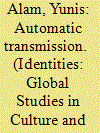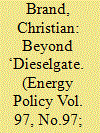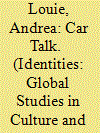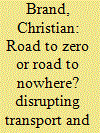|
|
|
Sort Order |
|
|
|
Items / Page
|
|
|
|
|
|
|
| Srl | Item |
| 1 |
ID:
160443


|
|
|
|
|
| Summary/Abstract |
This article is based on ethnographic research carried out in Bradford, an ethnically diverse city situated in the north of England. The sample of over 60 participants mostly comprises males of British Pakistani Muslim heritage but varies in terms other markers of identity such as social class, profession and residential/working locale. The article analyses the cultural value and meaning of cars within a multicultural context and how a consumer object can feed into the processes which refine and embed racialized identities. Small case studies reveal the concrete and discursive ways through which ideas around identity and ethnicity are transmitted and how, in particular, racialization continues to feature as a live, active and recognizable process in everyday experience.
|
|
|
|
|
|
|
|
|
|
|
|
|
|
|
|
| 2 |
ID:
150018


|
|
|
|
|
| Summary/Abstract |
The ‘Dieselgate’ emissions scandal has highlighted long standing concerns that the performance gap between ‘real world’ and'official’ energy use and pollutant emissions of cars is increasing to a level that renders ‘official’ certification ratings virtually ineffective while misleading consumers and damaging human health of the wider population. This paper aims to explore the scale and timing of historic and future impacts on energy use and emissions of the UK car market. To achieve this aim it applies a bespoke disaggregated model of the transport-energy-environment system to explore the impacts of retrospective and future policy scenarios on the UK car market, trade-offs between greenhouse gas and air quality emissions, and fuel use and associated tax revenues. The results suggest that the impacts on human health of ‘real world’ excess NOX emissions in the UK are significant. Future ‘low diesel’ policies can have significant air quality benefits while showing few (if any) carbon disbenefits, suggesting future car pricing incentives may need to be rebalanced taking more account of effects of local air pollution. Car pricing incentives are however unlikely to transform the car market without additional market changes, industry push, infrastructure investment and policy pull aimed at cleaner, lower carbon vehicles.
|
|
|
|
|
|
|
|
|
|
|
|
|
|
|
|
| 3 |
ID:
164299


|
|
|
|
|
| Summary/Abstract |
The apparent conspicuous consumption of luxury vehicles by Chinese international students attending a public Michigan University provides an opportunity to examine the convergence of different ideas about automobility. Upwardly mobile Chinese families send their children to Michigan, a state with a tradition of auto-production, for educational opportunities not available in China. The resulting ‘car talk’ of local residents about Chinese students and their cars speaks to broader anxieties about Michigan’s shifting relationship to the global economy. However, the paper focuses on the meanings of auto-owning created by Chinese students who make decisions about the purchase and use of their autos within a social world oriented primarily to other Chinese students and societal ideas about auto-owning circulating among friends, family and society in China. For Chinese students, car owning encompasses meanings of status, safety and sociability that are created within the context of study abroad.
|
|
|
|
|
|
|
|
|
|
|
|
|
|
|
|
| 4 |
ID:
176720


|
|
|
|
|
| Summary/Abstract |
The phasing out of conventional fossil fuel road vehicles is one of a number of potentially disruptive transport and energy policies. The implied technical substitution alone may be too slow to contribute meaningfully to meeting ‘net zero’ carbon reduction targets. This paper uses established modelling techniques and prospective scenario analyses in a UK case study to investigate what the impacts might be if we were more ambitious, how much disruption is needed to meet climate goals, the role of lifestyle and social change, and the potential implications for key actors in transport energy systems. Existing policies may neither hit carbon reduction targets nor make the early gains needed for a Paris-compliant trajectory. Deeper and earlier reductions in carbon and air quality emissions can be achieved by more ambitious but largely non-disruptive change of a 2030 phase out that includes (plug-in) hybrids. The earlier phase outs combined with lower demand for mobility and car ownership would make significant contributions to an emissions pathway that is both Paris compliant and meets urban air quality goals. Some disruption for technology providers, business and government can be expected in the more ambitious cases. The paper concludes by discussing key policy implications and recommendations.
|
|
|
|
|
|
|
|
|
|
|
|
|
|
|
|
| 5 |
ID:
187762


|
|
|
|
|
| Summary/Abstract |
Cars are a central means by which socio-political information is communicated in Lebanese public space, as is the case in other car cultures around the world. In Lebanon, cars are used to perform and reproduce structures of power within the country’s social hierarchy. In recent years, a highly developed system of automobile symbols and meanings has emerged and driving on the Lebanese roads requires that drivers become fluent in this ‘grammar’ of power. This article reconciles the anthropological ‘turn to the state’ with a growing body of literature on automobility in the Middle East and work on the roles of cars in social and political performance in a wide range of other cultural contexts. Following Mitchell’s theorisation of the ‘state effect’, this article argues that it is through this grammar, interpreted every day on the Lebanese roads, that state power is substantiated. However, Lebanese automobiles add a further layer of complexity to the ‘state effect’ by simultaneously drawing attention to the state’s fragmentation and impotency. They highlight other coexisting and competing systems of power. Lebanese drivers are disciplined in interpreting and acting on these signs on a daily basis. This article is an ethnographic account of the language of power embodied by automobiles. It gives a detailed analysis of the information conveyed by four main visual aspects of cars on the Lebanese road and explores the implications for understandings of statehood and power that emerge.
|
|
|
|
|
|
|
|
|
|
|
|
|
|
|
|
| 6 |
ID:
112317


|
|
|
|
|
| Publication |
2012.
|
| Summary/Abstract |
The use of LPG as automotive fuel is on the increase worldwide. In developing countries such as Ghana, the rudimental way of operating LPG cars is of a national concern since there is no clear cut framework within which they function. This paper presents a scenario of development from conversion of gasoline to LPG fuelling system in cars in Ho, Ghana. Data were collected through survey (100 questionnaires), in-depth interviews (2), Focus Group Discussions (3) and direct observations. The result shows LPG conversion is carried out by the local informally trained mechanics especially for Taxis because of its low consumption resulting in more profit. Conversion takes 1-2 day with an average estimated cost of GH? 450 cedis ($300). The LPG policy in Ghana focuses on domestic purposes hence the fuel being heavily subsidised. Challenges' being faced by the autogas market in Ghana includes; no clear cut policy, low number of refuelling stations, lack of standard conversion and installation kits and unprofessional LPG installers. In order for government to benefit from LPG as automotive fuel, coherent autogas policy should be formulated ensuring the availability of the LPG with price affordability as in the case of gasoline and diesel.
|
|
|
|
|
|
|
|
|
|
|
|
|
|
|
|
|
|
|
|
|